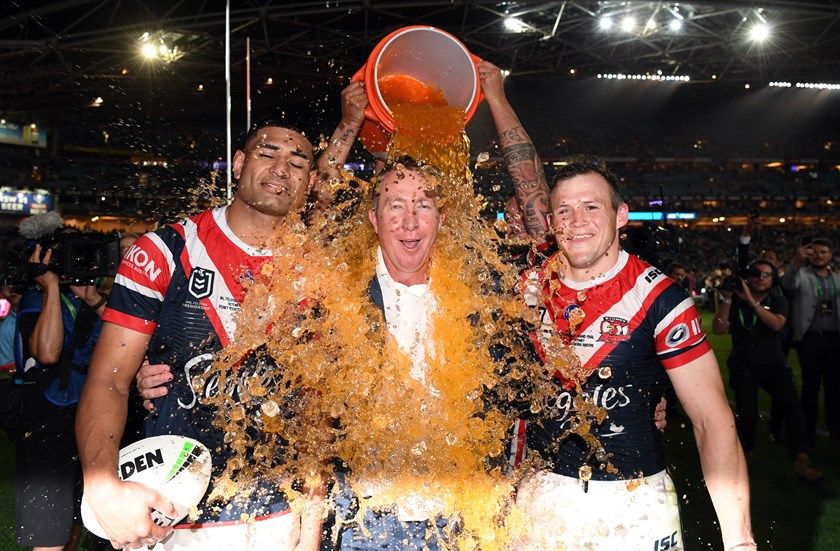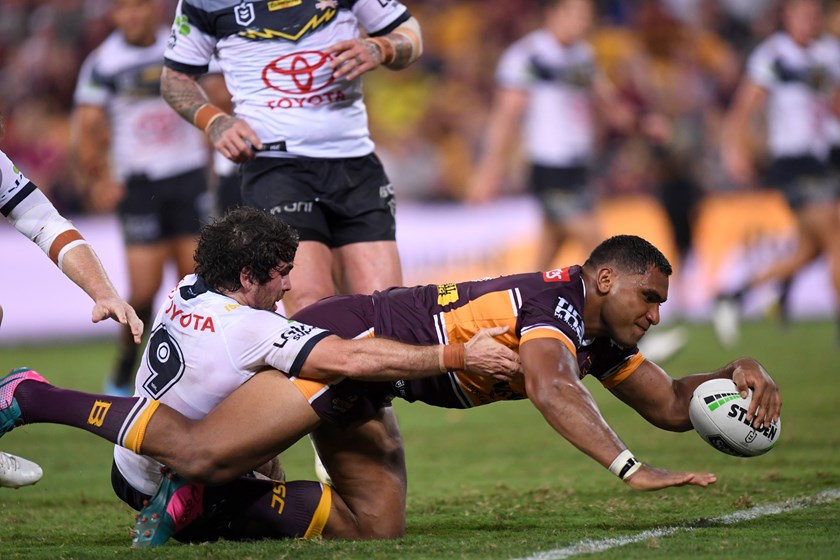Australians have always been wary of becoming too American. And to be honest, they've had good reason.
But as an Australian who has now lived in the USA over 13 years covering everything from Super Bowls and Stanley Cup Finals to golf majors, horseracing and Hollywood films there are some things coming out of American sports the National Rugby League could benefit from.
Sometimes we are resistant to change. We like our traditions. But the beauty of rugby league is it has always been an evolving sport.
It pays homage to the past while moving into the future. The laws we play under now are very different to those from 1908. And thankfully so.
The NRL announced a raft of changes recently, one of those has been borrowed from the NFL - the new challenge rule.
It looks like you may be using adblocking software to view this site.
Many features on the site, such as video playback, may not work properly when using adblocking software.
Please whitelist our domain or disable your adblocker to access all features and videos.
Back to Country: Indigenous players reconnect
How it will all play out in our game that is not as stop-start as American football remains to be seen. But the NRL is at least looking to innovate.
Taking things further, here are some ideas from the USA that could be applied successfully in the NRL.
NHL style sin bin
In 1981 the then NSWRL competition introduced the sin bin with options of five and 10 minutes. Over time the five-minute option was removed as the referees were facing accusations of inconsistency as to who was getting five and who was getting 10.
With the speed of the game so much faster these days, 10 minutes in the bin can prove to be the decisive factor between winning and losing a match.

Teams can concede two or even three tries while they are short-staffed and even if they don't, the added petrol used up can come back and bite them later on.
With the knowledge of this importance, referees can also be reluctant to use the sin bin.
The solution is to borrow an idea from the National Hockey League. When a player infringes in the NHL they get sent to a penalty box for two or five minutes.
They stay there until one of two things happen - the time runs out or the opposition scores. This could easily be applied to the NRL.
Players get a five-minute sin bin and are off until the time runs out, or the opposition scores points.
Imagine the discussion from captains whether to go for a try or take the penalty goal knowing they'll have an extra man for five minutes if they choose to run it (or miss the penalty goal).

Teams seem to happily give away penalties when defending their own goal line so they can reset the defensive line.
With the knowledge that the sin bin won't be as game-defining, referees can have the confidence to dispel the offending players if such negative play occurs.
This sin bin could also be used any time a player does something that ends up "on report" with the bunker using the five minutes to review footage and decide whether the player should be officially sent off.
Fewer games
The National Football League is routinely sold out across the country, especially in big markets.
Part of the reason for this is the season is short and sharp and fans are given a chance to miss it.
The NFL regular season is 17 weeks long, with 16 games and a bye for each team.
It looks like you may be using adblocking software to view this site.
Many features on the site, such as video playback, may not work properly when using adblocking software.
Please whitelist our domain or disable your adblocker to access all features and videos.
Best finishes of 2019: 12-man Sea Eagles stun Raiders
The playoffs go for another four weeks.
Sure, teams can be reluctant to give up home games ... but isn't eight sold-out home games better than 12 half-empty ones?
If the last World Cup and the rise of Tonga taught us anything, it is that we should be tapping into international rugby league and trying to grow our sport.
With a shorter NRL season, we could create a greater representative schedule and ensure the future of our sport with worldwide growth.
The Toronto Wolfpack are finally making a footprint in North America ... the time is now to capitalise.
An 18-round regular season would be ideal ... which leads into the next idea.
It looks like you may be using adblocking software to view this site.
Many features on the site, such as video playback, may not work properly when using adblocking software.
Please whitelist our domain or disable your adblocker to access all features and videos.
NRL Nines the next step in growing national game
Divisions
The American sporting landscape is littered with conferences and divisions.
Rather than have a traditional ladder in the NFL they have eight four-team divisions and the winners of each division earn a playoff spot, with two extra wildcard berths going to the next-best teams in each conference.
The downside is sometimes a division is poor and it still provides a playoff team at the expense of a better one.
But the upside is rivalries. Every year in the 16-game schedule you play your division rivals home and away. The NRL could adopt this idea with every team playing each other once, alternating on home and away each season – that's 15 games.
But the season could be 18 games if the NRL teams were put into four equal divisions for the purpose of the draw only. The current ladder structure can be retained.
You would then play your division rivals home and away each season.

The divisions could play on current rivalries.
Consider these splits – a guarantee of two games against your biggest rivals every year:
- Roosters, Rabbitohs, Dragons, Sharks;
- Eels, Wests Tigers, Panthers, Bulldogs;
- Broncos, Cowboys, Titans, Storm;
- Knights, Sea Eagles, Warriors, Raiders.
Injury reports
Earlier this season, NRL.com columnist Brad Walter pointed out the ducks and drakes NRL coaches try to pull with injured players.
The lack of transparency affects the game, not to mention your fantasy team. But in all seriousness, it can lead to integrity issues. They are a bigger concern in Australia given the prevalence of sports betting.
In the NFL, teams are forced to provide "full and complete" information about player availability in practice reports, game status reports and in-game injury reports.
The information must be "credible, accurate, timely and specific", and breaches can result in fines, suspensions and the forfeiture of draft choices.

Video review
This might bring some opposition but like the NFL we could have all scoring plays reviewed. The Bunker is there. Let's use it to check.
When the referee awards a try, the Bunker starts looking and only interjects if there is a clear reason for change.
This relieves the pressure on the on-field officials. They can err on the side of the attacking team if they think there might be a try knowing it will be reviewed.
The Bunker needs to look at it quickly and efficiently and roll on. Will this slow things up a little?
Possibly, but we can counter that with measures that are already in place and continue to evolve. The shot clock on scrums and dropouts helps and if we bring the interchange down to six ... and add a fifth reserve for HIA issues. We might be onto something.
Tailgating
A huge part of the American sporting experience is the pre-game tailgate.
Tailgating is a fancy word for a party in the car park. Fans arrive well in advance of the game but don't enter the stadium, instead invading the precinct with portable barbecues, family games and even televisions.
Kid zones are set up for those with little ones and everyone has a great time.
If we want to bring fans to the venues we need to create more of an atmosphere where it can be fun.
Clubs still can cash in on the parking fee and while fans can bring their own food and drink they can set up "official pre-game party zones" where food and beverages can be sold.
Family areas with face painting and jumping castles; adults only areas for a beer and a few big screens to catch the earlier game. Members-only parties with appearances from injured players and celebrities.
If you build it, they will come.
Ben Everill is a former Big League journalist who has lived and worked in the United States for the past 13 years. In the US, he covers golf, NFL and NBA
The views in this article do not necessarily express the opinions of the NRL, ARLC, NRL clubs or state associations.


